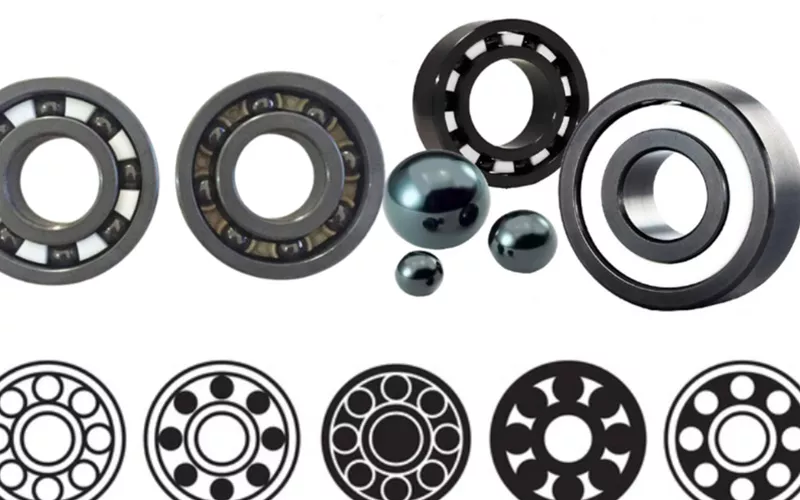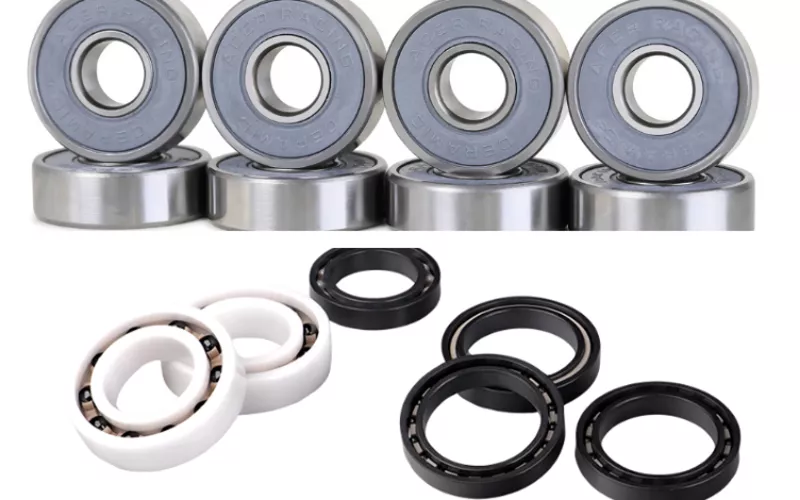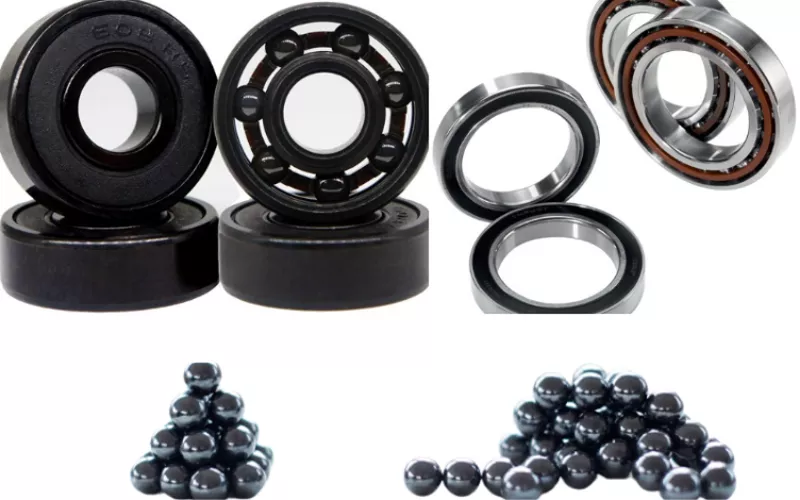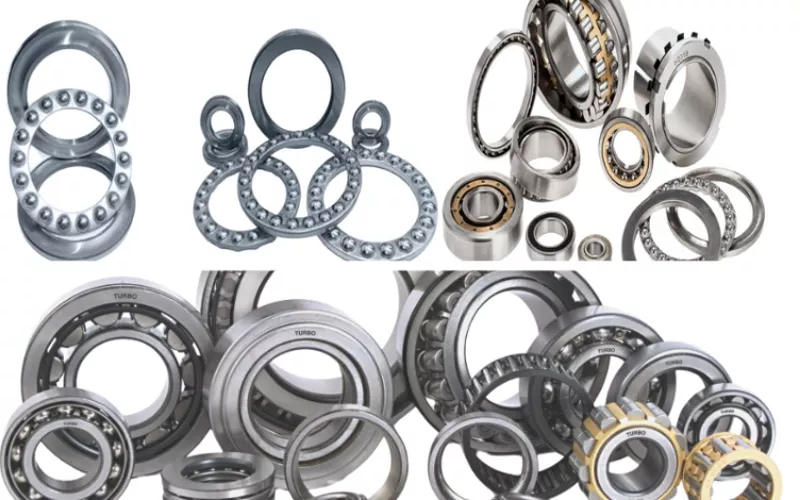Introduction
When it comes to aerospace, everything is important. Bearings are essential to smooth, reliable performance. But traditional steel bearings have their limitations; they wear, corrode, and fail in severe conditions. This is where silicon nitride ball bearings make all the difference. These ceramics are used for bearings that are stronger, lighter, and more heat-resistant than traditional ceramics, so they are a better option.
Quick Links
- What Are Silicon Nitride Bearings?
- Key Properties of Silicon Nitride Bearings
- Quick Facts for High-Performance Uses
- Silicon Nitride Bearings in Aerospace
- Hybrid Ceramic Bearings: A Breakthrough in Engineering
- The Role of Bearing Manufacturers & Suppliers
- Where to Buy Silicon Nitride Bearings?
- Conclusion
What Are Silicon Nitride Bearings?
Silicon nitride (Si₃N₄) is a high-performance ceramic material known for its strength and heat resistance. It is composed of silicon and nitrogen atoms arranged in a powerful crystal lattice. This provides it with unique properties that surpass those of conventional bearing materials.
The Si₃N₄ molar mass is 140.28 g/mol. It has low density, is lighter than steel. It also boasts great thermal conductivity, so remains stable under extreme temperatures.
I remember working with a maintenance team, swapping worn steel bearings in a satellite testing rig. They went with silicon nitride balls instead. The drop in friction was immediate. Weeks later, during the next inspection, the bearings looked untouched, no wear at all.
That’s why silicon nitride ceramic bearings fit aerospace so perfectly; every gram matters, and failure’s just not an option.
Difference Between Silicon Nitride Ceramic and Traditional Bearing Materials
Steel bearings are extremely heavy and wear out over time. They expand due to heat, leading to friction and performance problems. Silicon nitride ceramic bearings, on the other hand, are light, minimizing stress on machinery. They resist wear, so they remain in good condition longer.
Ceramic bearings are also less affected by high temperatures. Steel melts under heat, while Si₃N₄ does not. They are also rustproof and reliable in harsh conditions. Less friction means they run better and are more efficient.
I once cracked open an aircraft gearbox to find the steel bearings wrecked after only a few hundred flight hours. Then I replaced them with Si₃N₄. Two years later, the same gearbox was still humming along, no rust, no pitting, no drama.
These are the reasons aerospace engineers trust silicon nitride bearings. They handle conditions that make metal bearings tap out.
Key Properties of Silicon Nitride Bearings
Here are the interesting properties of silicon nitride balls:
High Strength & Density
Silicon nitride ceramic is lighter than steel but equally strong. It has about half the density of steel, with a density of around 3.2 g/cm³. This reduces stress on machinery as there is less weight, and increases performance.
Silicon nitride may be lightweight, but it can withstand extreme pressure. It is a 4000 MPa strength material that is resistant to heavy loads and sudden impacts. That toughness enables it to work in aerospace engines and high-speed, high-performance applications without cracking or deformation.
Thermal Stability & Conductivity
Silicon nitride remains chemically stable at high temperatures. It doesn’t expand nearly as much as steel when it heats up. Warping is thus prevented, and smooth operation in extreme conditions is ensured.
The Si₃N₄ thermal conductivity is about 20 W/m·K. Thus, it achieves good heat management, which can avoid overheating and offer thermal shock resistance. Silicon nitride’s (Si₃N₄) dielectric constant is around 8, which makes it a good electrical insulator. That adds safety in systems where resistance to heat and protection from electricity are both needed.
Low Friction & Wear Resistance
The bearings eventually wear out due to friction, but silicon nitride mitigates this. Its surface is smooth, which reduces contact resistance. This reduces heat generation, meaning equipment runs cooler and more efficiently.
Silicon nitride bearings balls last much longer than steel. They are corrosion-resistant, don’t wear down as easily, and need less lubrication. The result is fewer substitute parts needed, minimized maintenance expenses, and superior performance in high-demand uses.
Silicon nitride ceramic bearings are strong, heat-resistant, and durable. Their performance exceeds that of traditional materials, making them perfect for aerospace and other high-performance industries.
Quick Facts for High-Performance Uses
The following facts show why you should use silicon nitride bearing balls:
|
Property |
Value |
Benefit in Aerospace Use |
|
Density Silicon Nitride |
~3.2 g/cm³ |
Lightweight, reduces load |
|
Compressive Strength |
~4000 MPa |
Handles extreme pressure |
|
Thermal Conductivity |
~20 W/m·K |
Manages heat effectively |
|
Dielectric Constant |
~8 |
Electrical insulation |
|
Corrosion Resistance |
High |
Withstands harsh climates |
Silicon Nitride Bearings in Aerospace
I once chatted with an engineer who ran high-speed test drones. The heat was so intense, their steel bearings wore out in just weeks. When they switched to silicon nitride balls, those maintenance checks stretched to months. Saved them time, money, and probably a few headaches, too.
Want to know how they are used as an advanced material in aerospace? Here you go:
Why Aerospace Applications Demand High-Performance Bearings
Aerospace systems function in demanding conditions. Bearings need to tolerate high velocity, large loads, and sudden temperature changes. In such environments, standard steel bearings fail.
Jet engines require bearings that function reliably under heat and friction. If bearings don’t work, engine performance suffers, and safety is compromised. Satellites depend on bearings for accurate motion. They must withstand wear since repairs are not possible in space.
Bearings for high-speed aircraft also need to be strong. Broadband at supersonic velocities means very high pressures and temperatures on the materials. A weak bearing may result in a mechanical failure, which could jeopardize the whole airplane.
Benefits Over Metal Bearings: Lightweight, Durability, and Reduced Maintenance
Silicon nitride bearings are far lighter than steel ones. Less weight leads to less fuel consumption; a less heavy aircraft is more efficient. A lighter pump also puts less strain on other systems, which can extend the lifespan of other parts.
Another advantage is durability. One of these bearings does not corrode, wear, or thermally expand. They are strong under harsh conditions, providing safety in aerospace applications. Compared to metal bearings, they will not deform under heavy loads.
Silicon nitride yields lower maintenance costs. Its smooth surface minimizes friction and prevents heat generation. Less friction equals less lubrication required and fewer breakdowns. That saves time and money while keeping aircraft at peak condition.
Silicon nitride balls improve safety, efficiency, and performance. They are the best materials to use in the aerospace engineering field because of their advanced properties.
Hybrid Ceramic Bearings: A Breakthrough in Engineering
Hybrid ceramic bearings use ceramic balls with steel races. This combination gives you the benefits of both materials. The ceramic balls are harder and smoother than steel, so there is less friction. Composite races offer strength and flexibility, so these bearings are solid and durable.
Hybrid bearings have a longer life than steel bearings. Their ceramic balls are resistant to wear, heat, and corrosion. They are ideal for high-speed applications. You get better performance, and with less to maintain.
In aerospace, hybrid bearings deal with extreme temperatures and speeds. In industrial machinery, they improve service life and reduce downtime. Well, hybrid bearings also protect from electrical damage. Ceramic balls are insulators that prevent electrical currents from passing through. This shields motors and sensitive equipment from premature failure.
I remember once working on wind tunnel test rigs and watching a hybrid bearing setup run non-stop for months. Not one failure. That kind of uptime kept the schedule on track and spared the team weeks of frustrating delays.
Comparison with Fully Ceramic Bearings
Fully ceramic bearings are made of ceramic balls & races. They are also lighter and more corrosion-resistant than hybrid bearings. But they can be brittle under heavy impact.
Hybrid bearings are the perfect combination of toughness and wear resistance. Ceramic races are inferior to steel races when it comes to shock absorption. This makes hybrids a much better option in tough applications.
Fully ceramic bearings perform well in extreme conditions, but hybrid bearings are more versatile for most applications. They provide an ideal combination of speed, strength, and efficiency.
The Role of Bearing Manufacturers & Suppliers
You know what? Manufacturers and suppliers play an important role in high-quality aerospace bearings.
I once walked through an aerospace plant. Then I saw a batch of silicon nitride bearings going through weeks of brutal testing; heat, speed, vibration. Fail one test? Out they go. The survivors? Straight to the assembly line. That’s the kind of quality control that keeps planes in the sky.
And suppliers? They’re the ones who keep the flow going so bearings arrive on time. No delays, no excuses.
Key Ball Bearing Manufacturers and Their Role
The world’s leading manufacturers make high-precision ceramic bearings specifically for demanding applications. They spend a lot on research to advance silicon nitride materials and performance. They maintain durable and efficient systems and processes, even in extreme environments.
For aerospace, manufacturers design bearings that perform at high speeds and temperatures. They follow strict industry standards to ensure reliability. Each bearing is put through rigorous testing before it is used.
Bearing Ball Suppliers and Distributors for Aerospace
Manufacturers in the USA rely on suppliers to supply them with high-quality ceramic and steel balls. They do extensive research on the silicon nitride materials that have been proven to meet the rigorous standards of the aerospace industry and make sure that everything is constructed for precision and security. In aerospace, everything, even the smallest part, has to work perfectly after all.
On the other hand, distributors act as a bridge between ball bearing manufacturers and aerospace companies. They ensure that products are delivered quickly and efficiently, keeping supply chains on track.
Furthermore, a majority of the distributors take the initiative to provide personalized solutions according to the needs and specifications of their customers. This is all about getting the right part, at the right time, every time.
How Aerospace Companies Select Industrial Bearing Manufacturers
Aerospace companies are selective when choosing their ball bearing manufacturers based on quality and performance. They require components that are resilient enough to last under extreme circumstances. Compliance with industry standards is necessary.
Those who have dedicated teams focused on research will have an advantage. Ball bearing brands prefer suppliers who can provide not only technical expertise but also tailored solutions. Trust does not happen overnight; it is established over years of dependable performance.
In short, it’s all about delivering the best products, providing guidance, and maintaining reliability consistently.
Where to Buy Silicon Nitride Bearings?
You can purchase silicon nitride bearings from local distributors or online bearing supply stores. Many ball bearing suppliers offer worldwide shipping.
-
Local Suppliers: You can search for some of the bearing distributors in your area. Many suppliers of industrial equipment sell advanced ceramic bearings.
-
Online Stores: Major manufacturers and other industrial ball bearing suppliers have their websites with extensive selections.
-
Specialty Distributors: Many ball bearing companies in the USA specialize in aerospace-quality bearings and high-performance applications.
Bottom line? Stick with someone you trust. You need bearings that pass strict aerospace checks and perform exactly as promised.
Conclusion
Silicon Nitride Bearings are strong, low-friction, and very durable. This makes them perform better in extreme conditions, which applies to aerospace. Advanced ceramic materials are regularly growing to improve efficiency and stability in high-performance settings. Silicon nitride is also being positioned across other industries for its long-term advantages.
GORGEOUS is an advanced ceramics supplier with over 15 years of manufacturing experience, enabling us to consistently produce high-precision, reliable silicon nitride bearing balls and ceramic bearing assemblies. If you are looking for lightweight, low-friction, and high-durability silicon nitride bearing solutions, our professional engineering team can provide one-on-one service based on your drawings or technical parameters. Please feel free to contact us anytime for technical advice and quotations.
FAQs
1. How does silicon nitride handle high temperatures?
It stays stable and barely expands, even when things get really hot.
2. Are silicon nitride bearings better than steel for aerospace?
Yep. They last longer, resist corrosion, and handle stress like pros.
3. What is the thermal conductivity of silicon nitride?
Around 20 W/m·K, which helps spread and manage heat.
4. Can fully ceramic bearings replace hybrids in aerospace?
Only where there’s low impact. Hybrids handle shock better.



